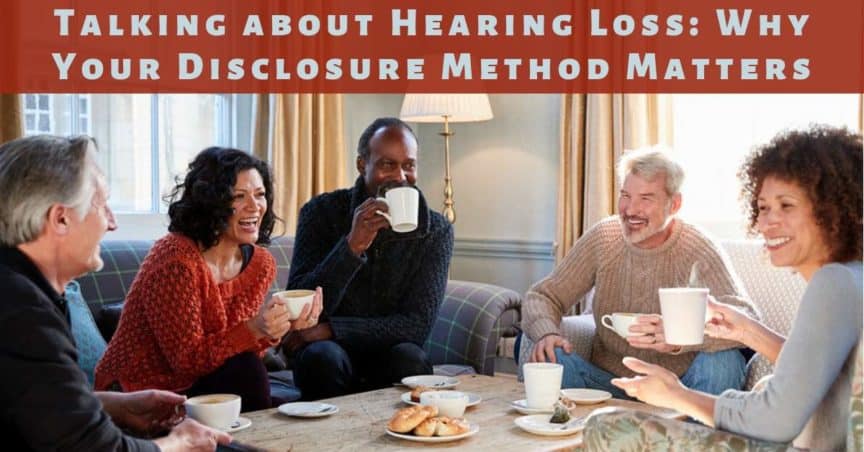The most difficult thing about your hearing loss journey is asking for help. It takes seven years for a person to finally muster the courage to seek treatment. But asking for medical help is only the start. You also need to continually ask for help from those around you. It turns out that this is more important that you might think.
Researchers at Massachusetts Eye and Ear infirmary surveyed over 300 adults with hearing loss in order to ascertain what the most common disclosure strategies. They were able to find three disclosure strategies which changed the outcome of their experience with hearing loss:
- Nondisclosure: The person with hearing loss doesn’t let others know they have hearing loss, and instead tells the speaker to speak more clearly or loudly.
- e.g. “Could you repeat that please?”
- Basic Disclosure: The person with hearing loss shares their condition with others, but crucially doesn’t let others know the best way to facilitate understanding.
- e.g. “I have hearing loss.”
- Multipurpose Disclosure: The person with hearing loss brings attention the condition and offers methods to help the speaker maximize communication.
- e.g. “I don’t hear as well out of this ear. Please speak to me on my left side.”
As to be expected, the researchers recommend that those with hearing loss follow the multipurpose method of disclosure, noting that they led to better outcomes for the people they surveyed who followed this method.
“We think it can be empowering for patients to know that these strategies, and especially the multipurpose disclosure strategy, are available to them,” Dr. Stankovic said.
Why your disclosure method matters
Talking about your hearing loss with others isn’t the easiest thing to do, but it’s important to get into the habit of advocating oneself to improve interactions with those around you.
It might sometimes seem rude to use a multipurpose strategy, but people can only help you if they know you need help, and know the most effective method to help you understand them.
Here are some ways in which you can leverage a multipurpose disclosure method to get the most out of your conversations with others.
Let them know if you can’t hear them
It’s important to let others know that your hearing aids aren’t a cure all. Your family members might shout questions from the other room or talk very quickly, or cover their mouth or hide their face when they speak. Ask them to speak at a good pace and with clear pronunciation, without covering their mouth.
At this point, you might also make it clear that they don’t need to raise their voice. Hearing aids already make everyday conversation loud enough and shouting might serve to distort the sound.
And don’t be afraid to ask other to repeat themselves. Asking for clarification from others is much better than pretending to understand them, and then responding inaccurately. Those who are aware of your hearing loss will be much more receptive to do so.
Let them know they need to get your attention first
If people are speaking to you, you might not be in a position to listen to them. Therefore, you can ask them to get your attention before the conversation. If they don’t, you might miss important details in the conversation. A simple tap on the shoulder or good eye contact will help prime you to listen to their words.
Let them know they need to look at you when they speak
Despite the power of today’s hearing aids, a little lip reading during conversations is still necessary in certain situations. That’s why it is important for them to be facing you when they are speaking to you. Facial expressions, eye contact and lip reading will go a long way towards helping you understand the conversation.
Let your employer and colleagues know what you need
Being clear with your needs are especially important at work, where your reputation is built on your ability to communicate and work effectively in teams. Your employer and employees have a duty to make ‘reasonable accommodations’ for your hearing loss. This might include:
- The right to choose the best seat during meetings.
- A quiet room for working.
- Asking others to email you instead of calling you about important matters.
By being completely honest and open with your needs, you can radically improve connections with your friends, family and work colleges.
Are you ready to open up to the world about your hearing loss? Great news! Ear-Tronics can help you in your journey. Call us now to set up a first consultation.

